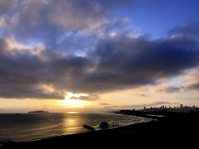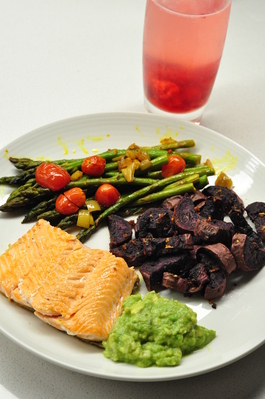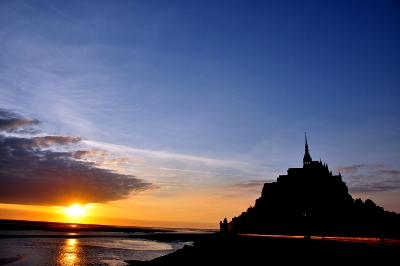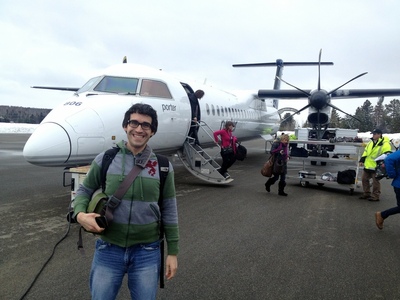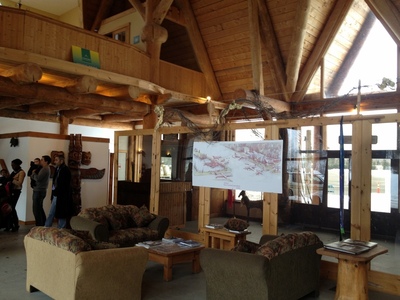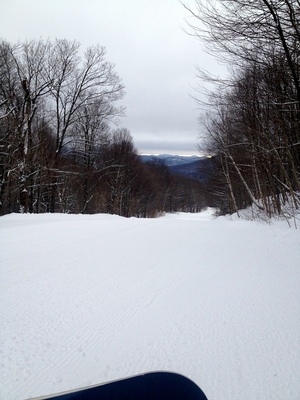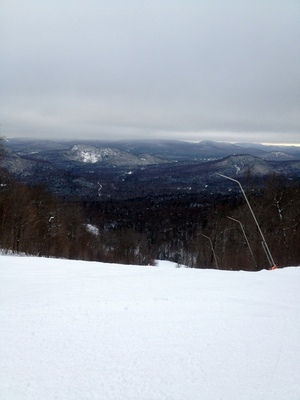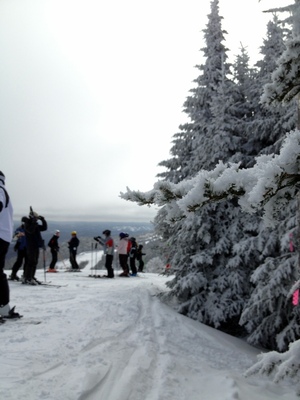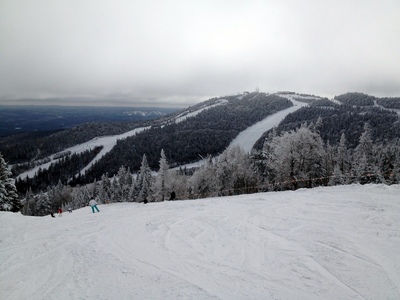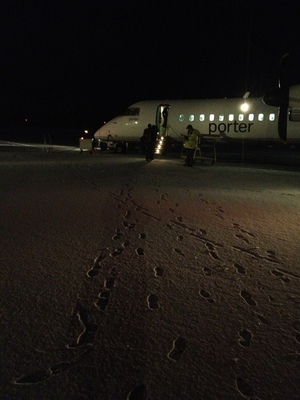I went to the Bay Area in October and I had an absolutely fantastic time. But it wasn't the sort of trip that warrants an entry on my trips page. It was a trip of fun times with the best of friends. But there's no real cohesive narrative and not many photos so it wouldn't work well in my usual style.
Half-way through my trip I realized that everything I had eaten to that point was special so I started writing it all down and continued to do so for the rest of my time in California. I meant to make a quick post of it all upon returning home, but time gets away. So I'm doing it now, better late than never.
Saturday was the beginning. Mike and I hit up the Ferry Building where I had this epic turkey and avocado open-faced bagel sandwich thing from Wise Sons Deli along with a slice of Pluot-blackberry pie and a bunch of free hummus samples. Oh, and also what have to be the best tomatoes I've ever tasted. Seriously, it was like summer in my mouth. Is produce always that good in California? Later on we went to La Boulange Bakery and I had quiche, a really good almond croissant and this amazing mango pop. Finally, as if this wasn't all good enough, Mike and I went for dinner at the Nihon Whisky Lounge. We had an array of Japanese-style tapas dishes including a mushroom tempura that was so good. And I hate mushrooms. Plus I had three different new scotches which were all pretty great too (Nikka 21yo, Caol Ila 16yo, Ardbeg Corryvreckan). After dinner we got hummus, beer and mochi ice cream from Healthy Spirits, a speciality liquor store near Mike's house. All three of these things were great.
On Sunday we got up and met Frank, Jess and Michal for brunch at Gussie's where we had fried chicken with waffles, cheesy grits, buttermilk biscuits, deep fried cheesy grits and candied yams. This was served with brown sugar syrup and it was all totally delicious. Like stupid good, and incapacitating. So we rolled on home and didn't eat again until supper when we had homemade salad with more hummus and mochi ice cream as well as an ataulfo mango and some fresh guava. To drink we had this brilliant tea made by TWG in Singapore especially for Dean & Deluca. It was a mix of green and white and is possibly the best tea I've ever tasted.
On Monday I had mini bananas (so cute) with almond butter for breakfast and then went to this cool Mexican restaurant for lunch with some people from the Autodesk San Francisco office. The place was packed and I could tell why given the food. Dinner was with Mike and Sivanny at a Chinese restaurant called Spices 2 where we shared a bunch of dishes, the best of which was a basil and eggplant plate that was just so good. For dessert Mike and I shared a Blueberry Cheesecake crepe which was as good as it sounds.
Tuesday breakfast was a repeat, but for lunch I went back to the ferry building and had a pulled pork sandwich with coleslaw and a really good (but pricey) apple. For dinner Mike and I went to Super Duper Burger and had garlic fries and pickles in addition to one of the best burgers I've ever eaten. Then we went to a free Macallan Scotch tasting event where we got to try the 10yo, 12yo, 15yo and 18yo Macallan's while a Scottish MC led us through with tasting notes. Super amazing. After that we had spanakopita and some Stalk and Barrel whisky back at Mike's place.
On Wednesday I switched from staying at Mike's house to staying with Matt and Adrienne in Cupertino. For breakfast I finished up the mini bananas and then didn't eat again till I got to south bay. First I had some homemade fig newtons from Adrienne which were great and I hope to make myself soon. For dinner we had stuff from the Apple cafeteria including a really good salad and this thai-style soup along with a chickpea noodle dish. The Apple cafeteria is kind of glorious. For dessert we had some awesome apple cake Adrienne made using four different types of apples along with some "Sea Salt and Turbinado Sugar" dark chocolate almonds and some chile-spiced dried mango, both from Trader Joe's.
On Thursday I had toast with fig butter for a quick breakfast and then met some co-workers back in San Francisco for brunch at Brenda's French Soul Food. First we shared some apple beignets which were basically the ideal form of doughnut. Then I had pork belly and a poached egg on top of cheesy grits with onion relish. I could eat that breakfast every single day and never tire of it. It was that good. I had lunch in the ILM cafeteria and it was sushi and seaweed salad prepared fresh in front on me by an actual sushi chef. So friggin' good. To drink I had raspberry-chia kombucha which seemed properly San Franciscan of me. For dinner I went back to Super Duper Burger with Matt and Adrienne and then I finished the day with the same food I started with: I took them back to Brenda's for more apple beignets. Oh, and later on we had the most gingery ginger beer I've ever tasted and it was great.
On Friday I had some yogurt and berries for breakfast before heading to the Cupertino Farmer's Market where I got to sample the best strawberries ever. They were fresh...on November 1!! Crazy. We bought a bunch of fresh produce to make a really good salad which we topped with a Meyer lemon and chile dressing. I also tried a sample of raw milk (tasted like normal milk) and a sample of persimmon. For dinner we did Mexican and I had a really yummy pork dish with a fresh strawberry-mango agua fresca. For dessert I had an excellent imperial stout from Stone Brewery and a chocolate-peanut butter malt ball from Whole Foods.
On Saturday I had fancy Jersey Cow milk yogurt from France out of a ceramic jar with fresh berries and sprouted almonds for breakfast. To drink I had fresh squeezed orange juice which was even better than the fresh orange juice I had in Florida long ago. In Monterey I had an apple galette and a double espresso at this excellent hidden bakery. Then for lunch we ate corn chips with homemade roasted hatch pepper salsa, fancy old cheddar, fig butter, roasted honey peanut butter, crackers, almonds, strawberries, salt water taffy (bacon maple flavour and chile mango flavour) and more of the fancy salt and sugar coated chocolate almonds. For dinner we found this great Thai restaurant in Morgan Hill called Siam Thai where I had a seafood eggplant curry dish with really good spring rolls. For dessert we had a Kouign amann which is croissant-type pastry with caramelized sugar on it.
On Sunday, for breakfast, I had more of the fresh orange juice along with...a pumpkin croissant! So good! Also we shared a pomelo which is like a mild grapefruit that is super challenging to peel. Lunch was a stupid amount of amazing food from Oren's Hummus, including the best hummus and best baba ganoush I've ever eaten. The baba ganoush was so smokey, like a good scotch! I topped it off with a Turkish coffee and then went home to Toronto.
So yeah, there is my trip as told by the food. As epic as the food was, I had an even better time with the people I visited. So yeah, really good trip.
